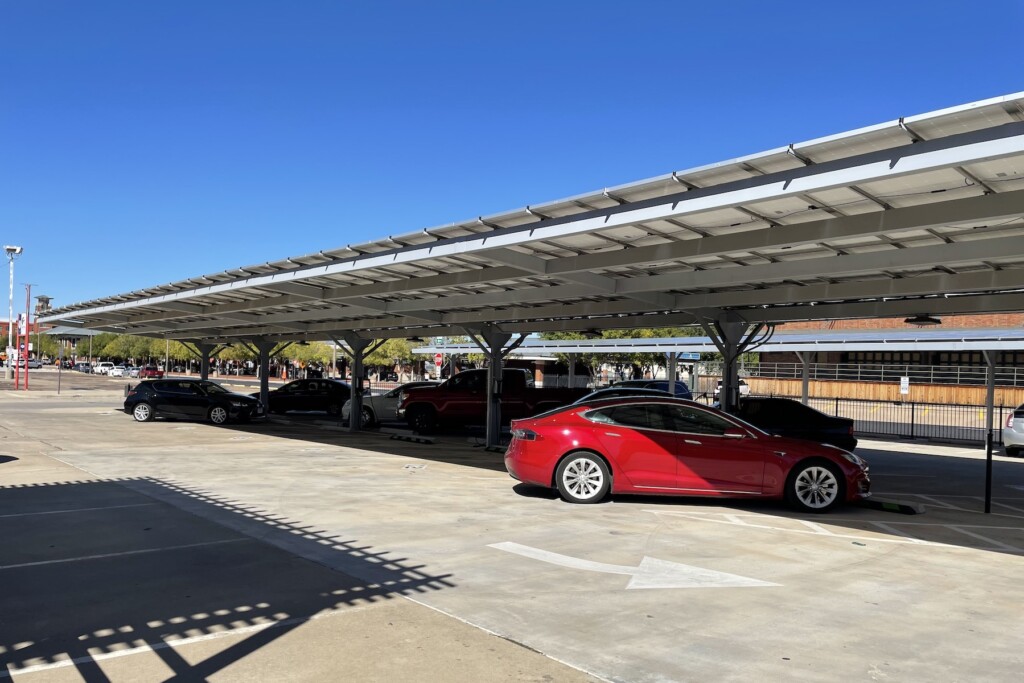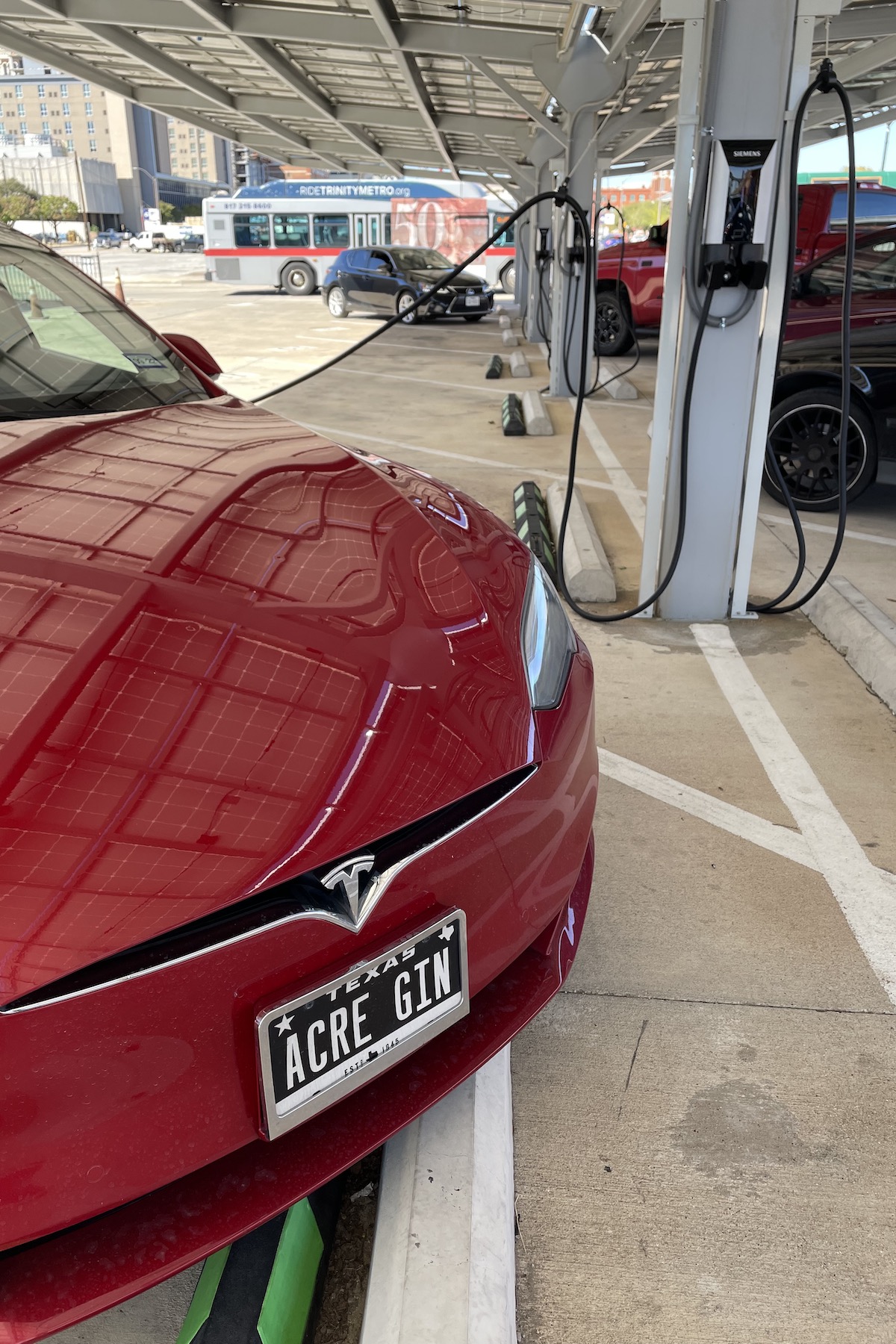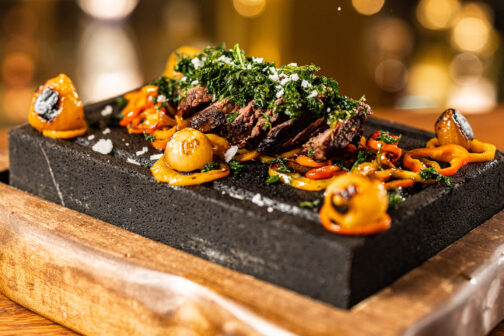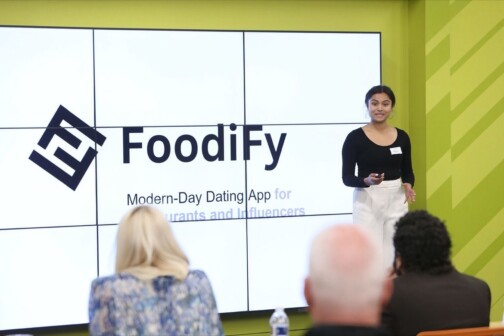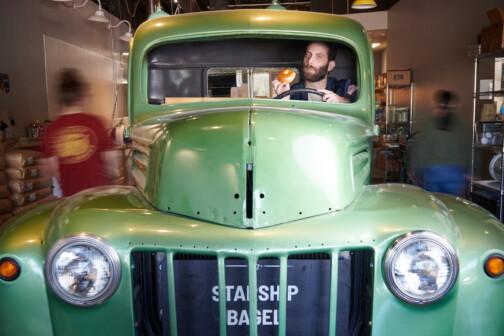The newest electric vehicles on the market advertise their ability to charge their batteries, at a direct current fast charger, in about 50 minutes. Fifty minutes is about how long it takes to eat lunch. Does that give you any ideas?
It certainly sparked a thought in my mind. Drivers already seek out the stations; why not capture their attention and sell them a burger?
For a reality check, I spoke with representatives of two food-service businesses that have installed charging stations to ask them about the practical challenges. I also embarked on a brief education in the charging industry.
We have to start with the fact that most EV stations are not the rapid 50-minute superchargers you find on highways between big cities—like the nearly two dozen Tesla superchargers at Collin Street Bakery in Bellmead. (That partnership was Tesla’s idea.) Most stations at local groceries, office plazas, apartment buildings, hospitals, and malls offer slower rates, enough for a small charge, unless you stay for hours.
But a small charge is still useful, and at least a few local food and beverage businesses are jumping into the charging business. Tony Formby, owner of Acre Distilling Co. in Fort Worth, said he installed chargers in his parking lot about two years ago, for his own Tesla. But the company has since replaced those originals with a bank of six new Siemens chargers.
“I’m not expecting this to be a big hit right away,” Formby said. “It’s going to take several years as demand for electric vehicles [rises].” Acre’s electric chargers are part of a larger project that included installing 300 solar panels over its parking lot in downtown Fort Worth.
“We are completely solar powered for the distillery and the barrel [storage] building next door,” Formby said, adding that the solar panels gave him another incentive to add EV chargers. “We generate about twice as much electricity as we use during the day, and the surplus gets sold to the grid. At night, we pull in from the grid. I sell to them for 4.5 cents per kilowatt hour. I buy back for 11 cents. My desire is to sell as much of our electricity as I can. I can sell electricity to a car owner for 20 cents, something like that, as opposed to selling it [to the grid] for 4 cents.” That 20-cent cost, by the way, is more than fair: after I talked to Formby, I looked up prices at nearby Blink chargers and saw that, at the time, they were running around 40 cents.
Acre hopes its chargers will generate profit. Drivers can purchase their power, then head inside and enjoy the distillery’s coffee program and food menu. Since the distillery is in downtown Fort Worth, there is also a chance that commuters at surrounding offices may pay for monthly parking passes that include charger access.
White Rhino Coffee, meanwhile, offers its Waxahachie customers electric charges for free. “We pay for the electricity as an amenity,” said Sara Escamilla, the chain’s chief operating officer. She added that the three stations are not on a separate meter, so they don’t track usage. “I will say that customers appreciate them and mention them as a nice amenity.” Although Waxahachie is currently the only spot in the chain to have EV stations, White Rhino is open to the idea of adding them elsewhere.
The biggest challenge—the reason that White Rhino and Acre are two of only a handful of food-service businesses in the EV game—is purchasing and installing the chargers themselves. But help is available in multiple forms, including the recently passed Inflation Reduction Act, which offers substantial tax breaks and incentives. Different charger companies offer different cost structures, too; White Rhino did not purchase the stations themselves but now pays for maintenance.
When I asked Formby if he had any advice for restaurateurs who are thinking about getting in the EV game, he suggested allying with existing big-name charging companies.
“I would probably stay away from startups,” he said. “The technology associated with these things is not rocket science. I decided to go with an established, well-known company like Siemens because they’re big. They have service. They can take care of you.” He also advised looking at the convenience of the final product. “Is there an app they can sign up for? Is there ability to take a credit card right there at a charger? There’s nothing worse than driving up to a charger and then figuring out how to get it to work.”
Ironically, the biggest long-term threat to a restaurant that wants to develop a profitable sideline selling energy is the likelihood that, eventually, EV chargers will be everywhere. One analysis suggests the United States could add 30 million stations in the next eight years, almost all of them at residences and apartment complexes. In other words, the market may quickly narrow to tourists.
But during that short window, I’d expect more restaurants to take advantage of the available incentives and install electric vehicle chargers in their parking lots. As Formby put it: “There’s the aspect of attracting customers to your location, and then there’s the aspect of getting a return on your investment.” Both benefits are appealing.
And it is pleasing to imagine a world where the best way for you to keep your car running is to go somewhere nice for lunch.
Eight North Texas Food and Drink Businesses with Electric Vehicle Chargers
This is not an exhaustive or complete list; I just surfed around PlugShare for a few hours, and encourage you to do the same if you are interested in learning more. The number in parentheses indicates the number of chargers available.
- Acre Distilling Co. in Fort Worth (6)
- White Rhino Coffee in Waxahachie (3)
- The Ranch at Las Colinas (2)
- Whiskey Cake in Plano (2)
- Twin Peaks in Plano (2)
- McDonald’s in downtown Irving (1)
- Marco’s Pizza in Irving (1)
- Hopdoddy in the Fort Worth Cultural District (1)
Get the SideDish Newsletter
Author



